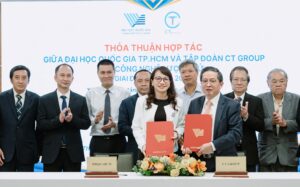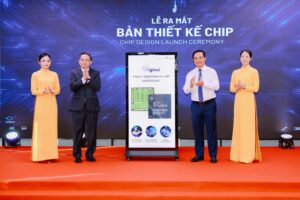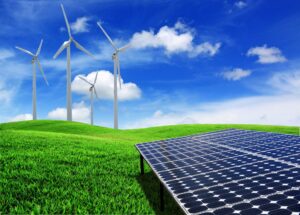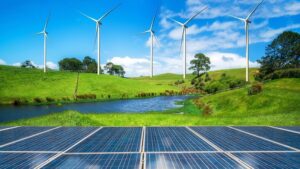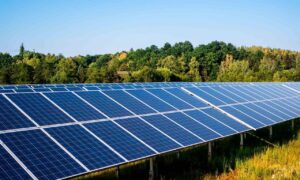The Electricity Law (amended) recently issued by the National Assembly has new regulations on the development of renewable energy and new energy.
Prioritize the exploitation and effective use of renewable energy sources.
The Electricity Law (amended) takes effect from February 1, 2025, consisting of 9 Chapters and 81 Articles, fully implementing and institutionalizing the spirit of Resolution No. 55-NQ/TW dated February 11, 2020 of the Politburo on the orientation of Vietnam’s national energy development strategy to 2030, with a vision to 2045.
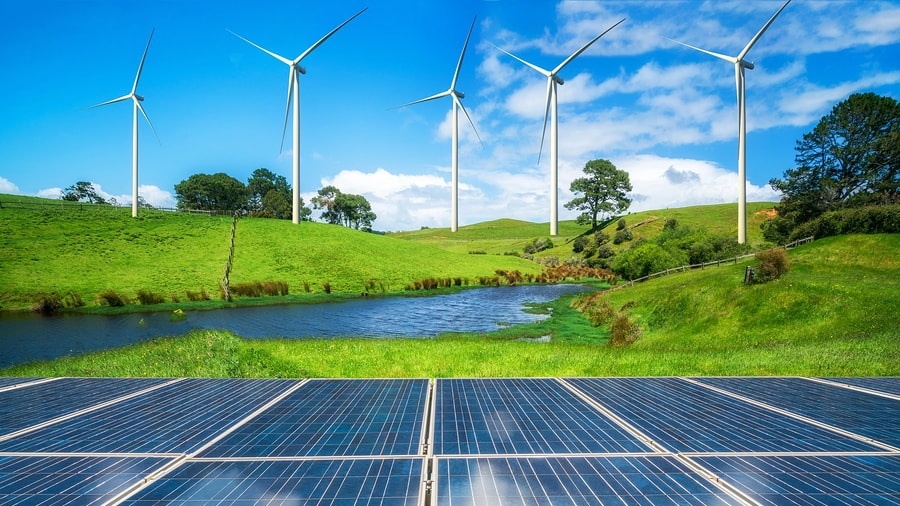
In which, Article 20. General provisions on the development of renewable energy and new energy electricity in Section 1, Chapter III of the Electricity Law (amended) clearly states that agencies, organizations and individuals carrying out activities related to the development and investment in the construction of new energy and renewable energy electricity projects have the following responsibilities: Comply with the provisions of Vietnamese law on national defense, security, social order and safety, public health, environmental protection, response to climate change, protection of resources, cultural heritage and preservation of historical – cultural relics, scenic spots; use modern techniques and technologies, comply with national technical regulations, apply standards in accordance with the provisions of Vietnamese law.
Principles of developing renewable energy and new energy include: Ensuring security of power supply and safety of the power system; developing in regions, areas and localities with potential and advantages in renewable energy and new energy and synchronizing with the development of infrastructure of the power system to avoid waste and loss in construction investment due to inability to release capacity in order to effectively exploit power sources, ensure reliable power supply; reduce technical losses, reduce pressure on long-distance power transmission; ensure environmental requirements and be suitable for social conditions of the development area.
Ensure synchronous training plans and human resource development to participate in research and activities in the fields of renewable energy and new energy, moving towards technological autonomy at a number of appropriate stages.
Prioritize the exploitation and effective use of renewable energy and new energy sources to exploit natural resources sustainably and reasonably, ensure national energy security and serve electricity export.
At the same time, prioritize the development of large power source projects to form factory clusters or renewable energy centers to promote natural advantages, power grid infrastructure and to be suitable for the capacity release capacity and operating requirements of the national power system of each region and locality, in accordance with the conditions and technological level in each period.
Encourage the appropriate development of rooftop solar power, solar power on water surfaces and irrigation reservoirs; prioritize development on the water surfaces of existing hydropower reservoirs, without having to invest in new power transmission grids; prioritize the development of offshore wind power associated with ensuring national defense, security, and maintaining national sovereignty over borders and islands.
Encourage organizations and individuals to invest in wind power and solar power projects combined with investment in electricity storage systems or production of green hydrogen and green ammonia to serve electricity generation and use.
For solar and wind power sources connected to the national power grid, the total generating capacity of the solar and wind power plants, including the capacity of the power storage system, must not exceed the capacity of the solar and wind power plants determined in the power development plan or the power supply network development plan in the provincial planning; the installed capacity is decided by the investor during the implementation phase of the construction investment project on the basis of ensuring the capacity ratio of the power storage system according to regulations and the efficiency of resource use.
Developing electricity from renewable energy and new energy creates the foundation for shifting the electricity structure towards low carbon, achieving the goal of reducing emissions and ensuring sustainable development of the electricity system.
The offshore wind power project includes all wind turbines built in Vietnam’s sea and located beyond the average low water line of the mainland towards the sea over many years.
Offshore wind power projects include the following types: Nearshore wind power projects with all turbines built within the sea area 6 nautical miles from the average low water line over many years of the mainland towards the sea; Offshore wind power projects with all turbines built within the sea area 6 nautical miles from the average low water line over many years of the mainland towards the sea.
The planning and investment in developing offshore wind power projects are in the following order of priority: Projects to produce electricity to supply electricity to the national power system; projects for self-production and self-consumption of electricity or projects for the production of green hydrogen, green ammonia and other needs to serve domestic needs; projects to produce electricity for export and produce green hydrogen, green ammonia for export.
Developing renewable energy and new energy at sea in accordance with the priority order of development of marine economic sectors in each period.
What mechanisms and policies do offshore wind power projects enjoy?
In Article 22. Development of self-produced and self-consumed electricity from renewable energy sources and new energy sources, Section 1, Chapter III of the Electricity Law (amended) stipulates: Self-produced and self-consumed electricity sources are connected to the national power system, the connection is carried out in accordance with the provisions of the law on electricity; surplus electricity output is sold in accordance with the provisions of the law; land for energy works and public lighting combined with multi-purposes is used in accordance with the provisions of the law on land.
Based on technical capacity, economic conditions and state budget capacity in each period, the Prime Minister and provincial People’s Councils shall issue support policies for households to install self-produced and self-consumed electricity as follows: Financial support for investment in installing rooftop solar power and electricity storage systems; technical support for design, solutions to ensure safety of construction loads, fire prevention and fighting solutions.
Article 23. Development of new energy power also stipulates: New energy power projects are clean energy production projects that are subject to tax policies, State investment credits and credits in accordance with relevant laws.
Based on the requirements for ensuring electricity supply security, scientific and technological progress, and socio-economic development conditions in each period, the Government shall prescribe the conditions and duration for applying the following mechanisms and policies to new energy power projects: Exemption and reduction of fees for using sea areas; exemption and reduction of land use fees and land rent; long-term minimum contract electricity output for projects selling electricity to the national power system on the basis of ensuring the interests of the State and people and the safety of the power system in each period.
Notably, Section 2, Chapter III of the Electricity Law (amended) stipulates the development of offshore wind power. It clearly states that offshore wind power projects are entitled to the following mechanisms and policies with conditions and terms prescribed by the Government: Long-term minimum contracted electricity output for projects selling electricity to the national power system; exemption and reduction of fees for using sea areas; exemption and reduction of fees for using land and renting land.
In addition, enterprises with 100% charter capital held by the State are exempted from guaranteeing the implementation of investment projects according to the provisions of the Investment Law; the Prime Minister shall consider and decide to grant credit exceeding the limit for a customer and related persons for offshore wind power projects according to the provisions of the Law on Credit Institutions.
Offshore wind power projects are identified as construction investment projects and are subject to the following regulations: Offshore wind power project surveys are subject to standards, technical regulations, economic-technical norms, unit prices according to international and foreign standards in cases where they have not been issued; offshore wind power projects are subject to standards, technical regulations according to international and foreign standards in cases where they have not been issued…
Investors prepare documents requesting approval of investment policy for offshore wind power projects, including: Enterprises with 100% charter capital held by the State prepare documents requesting approval of investment policy and simultaneously approving investors or prepare documents requesting approval of investment policy to bid for investor selection.
Investors conducting surveys at Point b, Clause 2, Article 27 of this Law in case the survey area and scale of the project are consistent with the power development plan shall prepare a dossier requesting approval of the investment policy to select investors.
The contents of the dossier requesting approval of investment policy and approval of investors, the dossier requesting approval or decision on investment policy of offshore wind power projects shall comply with the provisions of the Investment Law or the Law on Public Investment or the Law on Investment under the public-private partnership method and the following contents: Expected location, coordinates and area of the sea area used in lieu of documents determining the right to use the location to implement the investment project; expected time of use of the sea area.
Offshore wind power projects are selected for investors as follows: Public investment projects are implemented in accordance with the law on public investment; investment projects under the public-private partnership method are implemented in accordance with the law on investment under the public-private partnership method; business investment projects are implemented in accordance with the law on investment.
Except for projects under the authority of the National Assembly to approve investment policies, the Prime Minister shall approve investment policies and simultaneously approve investors for the following offshore wind power business investment projects: Projects not subject to bidding for selection of investors for national defense and security reasons according to the opinion of the Ministry of National Defense or the Ministry of Public Security; Projects approved for investment policies and simultaneously approve investors as prescribed in Point a, Clause 1, Article 28 of this Law.
The selection of investors to implement offshore wind power business investment projects to sell electricity to the national power system shall comply with the provisions of this Law and the law on bidding. The ceiling price of electricity in the bidding documents shall not be higher than the maximum price of the electricity generation price frame issued by the Ministry of Industry and Trade. The winning price of electricity for the investor selection is the maximum price for the electricity buyer to negotiate with the winning investor.

